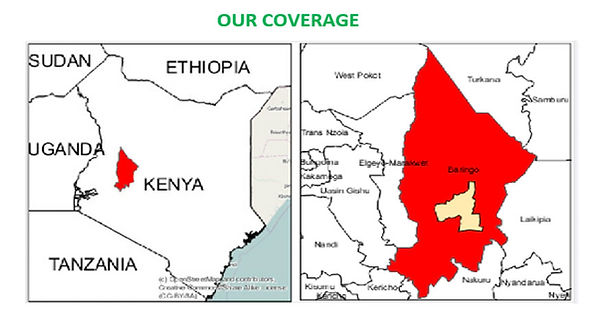About Us
Children Peace Initiative Kenya (CPI Kenya) is a civil society initiative, based in Kenya, specializing in the field of conflict prevention, and Peace Building, Governance and Development. It is a registered national non-profit organization committed to promote peace and development. The organization has four founding team members and 9 board of directors.
OUR VISION
We at Children Peace Initiative Kenya envision Peaceful society co-existing in harmony for social and economic development
OUR MISSION
Building bridges among neighbouring pastoralist communities by creating opportunities and capacities for them to engage in peace and development.
OUR CORE VALUES
-
Respect for diversity
-
Upholding Integrity
-
Professionalism and commitment to peace
-
Transparency and accountability
-
Advocating for human rights
OUR GUIDING PRINCIPLES
-
Integrity and Respect - We treat all our target populations and beneficiaries with respect and integrity. We take responsibility of our actions and are always accountable to all our stakeholders.
-
Inclusive Participation - We employ participatory approaches in the implementation of our programs to encourage ownership and sustainability of our interventions.
-
Result Oriented - We are committed to ensuring that our interventions are impactful to our beneficiaries.
-
Evidence-Based - Our programs are guided by information generated from evaluations, assessments and studies that we conduct during project design and implementation phases to ensure that our interventions are relevant and responsive to the needs of children and the communities at large.
-
Innovations - We recognize that the world is evolving and flexible and we purpose to adapt our interventions by identifying innovative strategies to meet the changing demands.
-
Capacity Building - We are constantly strengthening the capacities of our beneficiaries to improve their socio-development growth.
-
Partnerships - We recognize the importance of partnerships and are always ready to coordinate and work closely with INGOs, NNGOs, CSOs, Government and private sectors to deliver holistic services.
HISTORICAL BACKGROUND OF CPI KENYA
The genesis of CPI Kenya lies in the widespread and recurrent inter-ethnic conflicts that have
plagued pastoralist communities in Kenya’s Northern and North Rift regions. In 2009, following
devastating massacres in Baringo, Samburu, and Marsabit Counties, a group of concerned
citizens conceptualized an innovative model of peacebuilding that sought to empower children
to become agents of change. This initiative was driven by the realization that while children
were among the most affected victims of conflict, they were also uniquely positioned to
reshape inter-community relationships through friendship, empathy, and education.
Our Main operation area is Baringo County
Other areas include Marsabit, Samburu and Isiolo Counties among selected pastoralists communities affected by long lasting inte-thenici animosity. In Marsabit County the target areas are cross border areas of Forolle and Dukana. Other areas are Maikona, Kargi, Kalacha zone and North Horr, Loyangalani and IIeret zone. In Samburu our organization works in Samburu Central and baragoi sub counties. In Isiolo County CPI kenya works in Ngerema, Kambi Garba, Gotu and Daaba villages.
Officially registered in 2011, CPI Kenya’s foundational approach targeted schools located along conflict corridors, bringing together children from opposing ethnic groups to learn, play, and build bonds of trust. This “Children Peace Building” model created a ripple effect: children's cross-community friendships influenced parental perceptions, transformed inter group dynamics, and catalysed broader community interactions. Over the years, CPI Kenya’s programming evolved to incorporate structured dialogue, inclusive community participation, and capacity building. It has operated across eight conflict prone zones involving the Pokot, Samburu, Turkana, Ilchamus, Gabra, Rendille, Borana, and Tugen communities. The organization has gained national and international recognition for its evidence-based and culturally resonant programming.

